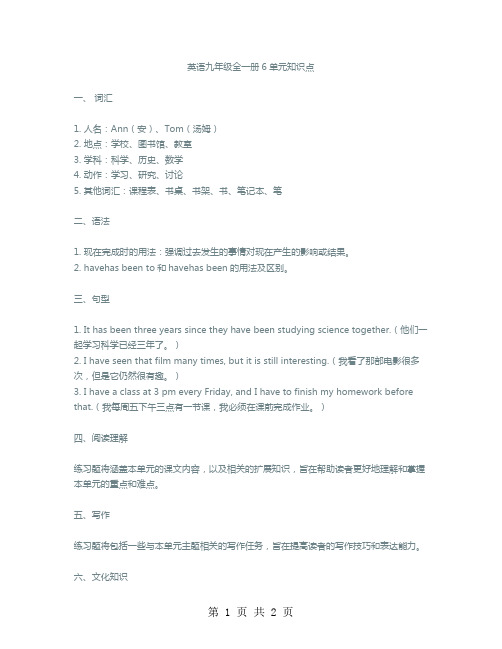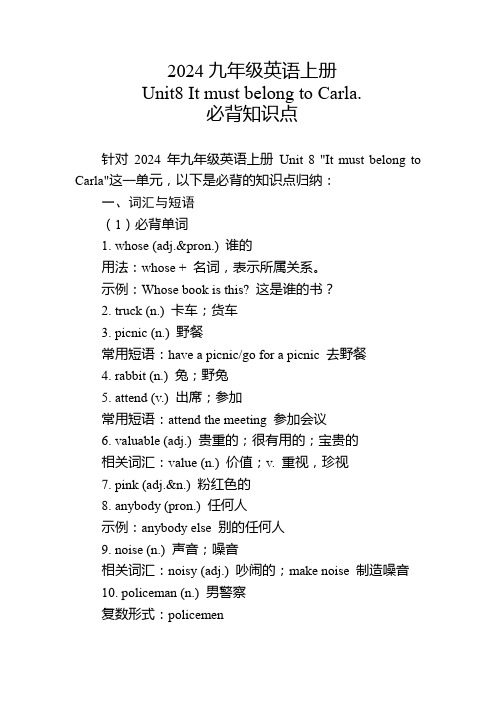九年级英语单元知识点
九年级英语上册各单元知识点归纳

九年级英语上册各单元知识点归纳第一单元:基础知识1. 介词短语的使用:介词短语是由一个介词和它的宾语组成的短语,用来表示时间、地点、方向、原因等。
例如:"on the table"(在桌子上),"in the park"(在公园里)。
介词短语在句子中作状语、定语、宾语等。
需要注意介词与宾语之间的搭配。
2. 动词的时态和语态:英语中的动词有多种时态和语态。
常见的时态有一般现在时、一般过去时、一般将来时等。
常见的语态有主动语态和被动语态。
时态用于表示动作发生的时间,语态用于表示动作的执行者。
例如:"She is reading a book."(她正在读一本书)。
需要注意时态和语态的用法和变化规则。
3. 名词的单复数形式:英语中的名词有单数和复数形式。
复数形式一般是在名词后面加-s或-es。
有些名词的复数形式较特殊,需要记忆。
例如:"a cat"(一只猫)的复数形式是"cats"(多只猫)。
需要注意名词的单复数形式在句子中的搭配和用法。
第二单元:阅读理解1. 完型填空:完型填空是一种考察学生对语境理解和词汇运用能力的题型。
在完型填空中,通常给出一篇文章和一些空格,要求学生根据文章内容和语境选择正确的单词或短语填入空格中。
通常需要结合文章整体逻辑和上下文意义来填写正确答案。
2. 阅读理解题:阅读理解题是一种考察学生阅读理解能力和推理能力的题型。
通常会给出一篇短文或文章,然后根据文章内容提出一些问题,要求学生根据文章内容和推理来回答问题。
需要学会熟练阅读和理解文章,抓住关键信息和主题,并能运用推理等能力来回答问题。
第三单元:语法知识1. 直接引语和间接引语:在英语中,当我们引述别人的话时,可以使用直接引语和间接引语。
直接引语是直接引用别人所说的话,使用引号将其包围;间接引语是将别人所说的话转述出来。
例如:直接引语:"I am happy," she said.(她说:“我很开心。
九年级英语单元知识点总结

由“助动词be +及物动词的过去分词”构成助动词be 有人称、数和时态的变化,其变化规则与be 作为连系动词时完全一样。
时态被动语态结构例句一般现在时 amare +过去分词isEnglish is spoken inmany countries.一般过去时 was +过去分词 were + 过去分词 This bridge was built in 1989.情态动词 can/shouldmay +be+过去分词must/……The work must be doneright now.③被动语态的用法当我们不知道谁是动作的执行者,或者没有必要指出谁是动作的执行者,或者只需强调动作的承受者时,要用被动语态。
2. allow sb. to do sth. 允许某人做某事(主动语态)如:Mother allows me to watch TV every night. 妈妈允许我每晚看电视。
be allowed to do sth. 被允许做某事(被动语态)如: LiLy is allowed to go to Qinzhou. 莉莉被允许去钦州。
3. get their ears pierced 穿耳洞让/使(别人)做某事 get sth. done(过去分词)have sth. done 如:I get my car repaired. == I have my car repaired. 我让别人修好我的车 I want to have my hair cut. 我要理发. 4. enough 足够形容词+enough 如:beautiful enough 足够漂亮 enough+名词如:enough food 足够食物 enough to 足够…去做…如:I have enough money to go to Beijing. 我有足够的钱去北京。
She is old enough to go to school.她够大去读书了。
人教版九年级英语全册各单元知识点和配套练习

新目标九年级英语单元知识点及配套练习Unit 1 How do you study for a test?1、一般现在时(特别是单数第三人称作主语);2、动词作主语的形式(现在分词和不定式);3、介词后面的动词形式(~ing);4、What about+~ing;How about+~ing;5、too+形(副)+to(不定式);6、find+宾语+宾语补足语;7、not…at all;8、get+形容词;9、某些动词后面的动词必须用~ing;10、unless条件状语从句→if条件状语从句→…,or…〔并列句〕;11、instead/instead of;12、listen to13、ask(sb.)for(sth.);14、for example;15、have fun(doing sth.)16、end up〔with…)17、spoken English;English—speaking18、make mistakes19.talk to(with) sb.20、why don’t you(we,they 〕+动词原形=why not+动词原形21、laugh at22、first of all23、to begin with.24、later on25、be afraid of sth.(doing);be afraid to do sth.;be afraid that从句26、in class/out of class /after class27、take notes28、get an“A〞in English29、(sb.)be impressed by(with)…30、have trouble doing sth.(回见15)31、look up32、make up a conversation.33、around the world.34、deal with35、stay(keep)+形容词36、go by37、decide(not)to do sth.38、主语+last(延续) for long39、regard sb.(sth.)as…/hink of sb.(sth.)as…40、complain about sth.41、compare sth to sth.〔把…比作…〕;compare sth with sth.〔把…及…进展比拟〕42、physical problems43、break off44、in a positive way45、study for a test46、learn a lot 〔in〕that way47、keep an English notebook48、区别:sound,voice,noise49、区别:loud,aloud,loudly50、find sb./sth.+宾语补足语;find it +宾语补足语+〔for sb.〕to do sth.51、try one's best 〔to do sth.〕52、with the help of =with one's help53、much too 及too much练习:1.Everyone ______(want)to study English well.2.______(listen) to English every day ______ (help) him a lot.3.How about ______ (be) a musician That's great!4.The stone looks too big for her to move.(1)译成汉语;〔2〕用so…that…改写。
九年级前五单元英语知识点

九年级前五单元英语知识点一、名词性从句名词性从句是句子的成分,充当主语、宾语、表语或同位语等。
在句中起到名词的作用,可以由关系代词、连词或疑问词引导。
1. 关系代词引导的名词性从句关系代词有:that, which, who, whom, whose。
例如:- The book that/which you borrowed from me last week is very interesting.- The girl who/whom we met at the party is my cousin.2. 连词引导的名词性从句主要有:whether, if, that, as if, as though等。
例如:- I don't know whether/if he will come to the party.- He talks to us as if/as though he knows everything.3. 疑问词引导的名词性从句疑问词有:what, where, when, why, how, whether等。
例如:- I don't know what you are talking about.- Can you tell me where she lives?- Do you know when the concert will start?二、形容词性从句形容词性从句是句子的成分,充当修饰名词或代词的作用。
它可以由关系代词或关系副词引导。
1. 关系代词引导的形容词性从句关系代词有:that, which, who, whom, whose。
例如:- The dress that/which she is wearing is very beautiful. - The boy who/whom you saw just now is my brother.2. 关系副词引导的形容词性从句关系副词有:when, where, why。
英语九年级全一册6单元知识点

英语九年级全一册6单元知识点一、词汇1. 人名:Ann(安)、Tom(汤姆)2. 地点:学校、图书馆、教室3. 学科:科学、历史、数学4. 动作:学习、研究、讨论5. 其他词汇:课程表、书桌、书架、书、笔记本、笔二、语法1. 现在完成时的用法:强调过去发生的事情对现在产生的影响或结果。
2. havehas been to和havehas been的用法及区别。
三、句型1. It has been three years since they have been studying science together.(他们一起学习科学已经三年了。
)2. I have seen that film many times, but it is still interesting.(我看了那部电影很多次,但是它仍然很有趣。
)3. I have a class at 3 pm every Friday, and I have to finish my homework before that.(我每周五下午三点有一节课,我必须在课前完成作业。
)四、阅读理解练习题将涵盖本单元的课文内容,以及相关的扩展知识,旨在帮助读者更好地理解和掌握本单元的重点和难点。
五、写作练习题将包括一些与本单元主题相关的写作任务,旨在提高读者的写作技巧和表达能力。
六、文化知识本单元还将涉及一些与科学和历史相关的文化知识,包括一些科学原理和历史事件,以及它们在现实生活中的应用。
读者可以通过了解这些知识,更好地理解西方文化和社会。
总的来说,本单元的学习内容丰富,涵盖了词汇、语法、句型、阅读理解、写作和文化知识等多个方面。
通过系统地学习和练习,读者可以更好地掌握本单元的知识点,提高自己的英语水平。
2024九年级英语上册Unit8必背知识点

2024九年级英语上册Unit8 It must belong to Carla.必背知识点针对2024年九年级英语上册Unit 8 "It must belong to Carla"这一单元,以下是必背的知识点归纳:一、词汇与短语(1)必背单词1. whose (adj.&pron.) 谁的用法:whose + 名词,表示所属关系。
示例:Whose book is this? 这是谁的书?2. truck (n.) 卡车;货车3. picnic (n.) 野餐常用短语:have a picnic/go for a picnic 去野餐4. rabbit (n.) 兔;野兔5. attend (v.) 出席;参加常用短语:attend the meeting 参加会议6. valuable (adj.) 贵重的;很有用的;宝贵的相关词汇:value (n.) 价值;v. 重视,珍视7. pink (adj.&n.) 粉红色的8. anybody (pron.) 任何人示例:anybody else 别的任何人9. noise (n.) 声音;噪音相关词汇:noisy (adj.) 吵闹的;make noise 制造噪音10. policeman (n.) 男警察复数形式:policemen11. wolf (n.) 狼复数形式:wolves12. happening (n.) 事件;发生的事情13. uneasy (adj.) 担心的;不安的14. laboratory (n.) 实验室15. coat (n.) 外套;外衣16. sleepy (adj.) 困倦的;瞌睡的相关短语:feel sleepy 感到困倦;asleep (adj.) 睡着的;fall asleep 入睡;sleeping (adj.) 熟睡的17. outdoors (adv.) 在户外18. suit (n.) 西服;套装v. 适合;suit sb. fine = fit sb. well 非常适合某人19. alien (n.) 外星人20. express (v.) 表示;表达n. expression 表情,表达21. circle (n.) 圆圈v. 圈出22. Britain (=Great Britain) 大不列颠23. receive (v.) 接待;接受;收到注意:与accept区分,receive仅表示客观上收到,主观上接受用accept24. leader (n.) 领导者;领袖v. lead 领导;导致25. medical (adj.) 医疗的;医学的n. medicine 药;medical research 医学研究26. purpose (n.) 目的;目标常用短语:the purpose of ……的目的;on purpose 故意地(2)必背短语1. belong to 属于2. pick up 捡起;拾起3. used to 过去常常4. nothing much 没什么事5. at first 起初6. in the neighborhood 在街区里7. go away 离开8. listen to classical music 听古典音乐9. at school 上学;求学10. go to the concert 去听音乐会11. have any/some idea 知道12. a math test on algebra 有关代数的数学考试13. the final exam 期末考试14. because of 因为15. a present for his mother 送给他妈妈的礼物16. run for exercise 跑步锻炼17. milk shake 奶昔18. turn on/off 打开/关上19. pour…into…将…...倒入…...20. a cup of yogurt 一杯酸奶21. on Saturday morning 在星期六早上22. cut up 切碎23. put…into…将…...放入...…24. one more thing 还有一件事25. a piece of 一片/一张/一块26. at this time 在此时27. a few 几个28. fill…with…用…装满29. cover…with…用......覆盖30. mix up 混淆;混合31. take turns 轮流32. try one's best 尽某人最大的努力33. make a difference 有影响;起作用34. in a hurry 匆忙地35. on one's way 在某人去……的路上二、语法结构1. 情态动词must, might, could, can't表示推测must 表示肯定的推测,意为“一定,肯定”。
九年级英语第1单元-知识点总结

九年级英语第1单元-知识点总结第一部分:基础词汇和短语1. Greetings and Introductions在英语中,问候和介绍是日常生活中常用到的交际用语。
常见的问候方式包括:“Hello!”、“Hi!”、“Goodmorning/afternoon/evening!”等。
而自我介绍的常用表达为“I am...”、“My name is...”等。
2. Classroom English在教室里,学生和老师之间的交流需要使用一些特定的英语表达。
例如,“May I come in?”、“May I go to the washroom?”、“Can you repeat that, please?”等。
3. Numbers and Dates数字和日期是我们日常生活中无法绕开的内容。
需要掌握基本的数字、基数词、序数词等,以及日期的表达,例如“Today is...”、“It's Monday.”、“My birthday is on October 15th.”等。
4. Time谈论时间也是英语学习的重要内容,掌握“in themorning/afternoon/evening”、“at 9 o'clock”、“from...to...”等表达方式非常实用。
5. School Subjects and Facilities学校科目和设施是我们在学校中经常需要提及的。
诸如“Mathematics”、“Science”、“Library”、“Computer lab”等词汇需要熟练掌握。
6. Adjectives and Adverbs形容词和副词是用来描述人、事物和行为的重要词汇。
例如“beautiful”、“kind”、“quickly”、“carefully”等。
第二部分:语法知识点1. Simple Present Tense学习现在时态是英语学习的基础。
在这一时态中,主语和动词的形式要保持一致,例如“I play football.”、“He dances well.”。
九年级上册英语1到5单元知识点

九年级上册英语1到5单元知识点总结1. Unit 1: Best friends- Vocabulary: friendship,panion, trust, support- Grammar: present continuous tense, possessive pronouns - Topic: The importance of friendship and how to be a good friend2. Unit 2: English around the world- Vocabulary: bilingual, dialect, accent, globalization- Grammar:parative and superlative adjectives, adverbs of frequency- Topic: The influence of English as a global language and its variations in different countries3. Unit 3: Travel journal- Vocabulary: destination, itinerary, amodation, excursion- Grammar: past simple tense, past continuous tense- Topic: Sharing travel experiences, discussing favorite destinations, and describing past trips4. Unit 4: Great inventions- Vocabulary: innovation, breakthrough, patent, prototype- Grammar: reported speech, passive voice- Topic: Exploring the impact of inventions on society and discussing the process of innovation5. Unit 5: Health and well-being- Vocabulary: nutrition, fitness, well-being, hygiene- Grammar: modal verbs, conditional sentences- Topic: Promoting a healthy lifestyle, discussing the importance of exercise and balanced dietBased on the above knowledge points, it is clear that the ninth-grade English curriculum covers a wide range of topics from interpersonal relationships to globalmunication, from personal experiences to technological advancements, and from physical health to overall well-being. As a language, English not only serves as a means ofmunication but also provides insights into various aspects of life and society.In Unit 1, the focus on friendship highlights the importance of building and maintaining meaningful relationships. The vocabulary related to friendship emphasizes qualities such as trust and support, while the grammar lessons on present continuous tense and possessive pronouns enable students toexpress their thoughts and emotions more accurately. By incorporating these language elements into discussions about friendship, students are able to deepen their understanding of the topic and express themselves more fluently.Moving on to Unit 2, the exploration of English as a global language introduces students to the diversity of language and culture. The vocabulary related to bilingualism and globalization sheds light on the influence of English in different contexts, while the grammar lessons onparative and superlative adjectives provide a framework forparing and contrasting languages. Through discussions on language variations and the impact of globalization, students gain insights into the interconnectedness of the world and the importance of cultural exchange.In Unit 3, the travel journal serves as a platform for students to share their experiences and broaden their perspectives. The vocabulary related to travel and the grammar lessons on past tenses enable students to narrate their past experiences and plan future trips. By engaging in discussions about favorite destinations and travel itineraries, students not only enhance their language skills but also develop a sense of curiosity andadventure.Unit 4 delves into the realm of innovation and invention, offering students a glimpse into the world of creativity and problem-solving. The vocabulary related to innovation and the grammar lessons on reported speech and passive voice provide students with the tools to discuss technological advancements and their impact on society. Through debates on the pros and cons of various inventions, students develop critical thinking skills and an appreciation for human ingenuity.Finally, in Unit 5, the focus on health and well-being encourages students to reflect on their lifestyle choices and habits. The vocabulary related to nutrition and fitness,bined with the grammar lessons on modal verbs and conditional sentences, empowers students to advocate for a healthy lifestyle and express their concerns about public health issues. By engaging in conversations about the importance of exercise and balanced diet, students not only improve their language proficiency but also cultivate a sense of responsibility towards themselves and others.In conclusion, the ninth-grade English curriculum offers a richtapestry of topics that not only enhance language skills but also foster personal growth and broadened perspectives. By incorporating vocabulary, grammar, and topics that are relevant to students' lives, the curriculum provides an engaging and meaningful learning experience.As a writer, I personally find the integration of language learning with real-life topics to be highly effective in stimulating students' interest and fostering a holistic understanding of the English language. Furthermore, the emphasis onmunication skills and critical thinking in the curriculum equips students with the tools to navigate a rapidly changing world, both linguistically and intellectually.In summary, the ninth-grade English curriculum, with its diverse range of topics and language elements, not only prepares students for linguistic proficiency but also nurtures their intellectual curiosity and global awareness. Through the exploration of friendship, globalmunication, travel experiences, technological advancements, and health consciousness, students are not only equipped with language skills but also empowered to navigate theplexities of the modern world. This holistic approach to language learning is essential in nurturingwell-rounded individuals who are capable of engaging with the world in a meaningful and impactful manner.。
- 1、下载文档前请自行甄别文档内容的完整性,平台不提供额外的编辑、内容补充、找答案等附加服务。
- 2、"仅部分预览"的文档,不可在线预览部分如存在完整性等问题,可反馈申请退款(可完整预览的文档不适用该条件!)。
- 3、如文档侵犯您的权益,请联系客服反馈,我们会尽快为您处理(人工客服工作时间:9:00-18:30)。
九年级英语单元知识点
打盹会做梦,学习会圆梦。
要想提高自身的学习成绩,则需要实际行动起来,不能三天打鱼,两天晒网,学习如同逆水行舟,不进则退。
下面是小编给大家整理的九年级英语单元知识点,希望对大家有所帮助。
一、将来完成进行时
1.概念:表示动作从某一时间开始一直延续到将来某一时间。
是否继续下去,要视上下文而定。
2.基本结构:shall/will have been doing
3.例子:I shall have been working here in this factory for twenty years by the end of the year.到今年年底,我将在这个工厂工作 20 年了。
If we don't hurry up the store will have been closing before we get there. 咱们如不快一点儿,等我们到了那儿,店门就会关了。
二、过去将来完成进行时
1.概念:表示从过去某时看至未来某时以前会一直在进行的动作。
2.基本结构:should/would + have + been +现在分词
3.例子:He told me that by the end of the year he would have been living there for thirty years.他告诉我,到年底时,他就在那住了 30 年了。
使用被动语态应注意的几个问题:
1. 不及物动词无被动语态。
What will happen in 100 years.
The dinosaurs disappeared about 65 million years ago.
2. 有些动词用主动形式表示被动意义。
This pen writes well.
This new book sells well.
3. 感官动词或使役动词使用省略 to 的动词不定式,主动语态中不带 to ,但变为被动语态时,须加上 to 。
例:make somebody do something→somebody+ be +made to do something
see somebody do something→somebody +be +seen to do something
A girl saw my wallet drop when she passed by.→My wallet was seen to drop by a girl when she passed by. The boss made the little boy do heavy work.→The little boy was made to do heavy work by the boss.
4. 如果是接双宾语的动词改为被动语态时,直接宾语(物)作主语,那么动词后要用介词,这个介词是由与其搭配的动词决定。
He gave me a book.→A book was given to me by him.
He showed me a ticket.→A ticket was shown to me by him.
My father bought me a new bike. →A new bike was bought for me by my father.
Unit 10 The world around us
fur 与 leather
fur 指皮毛,尤指带毛的皮革制品,leather 指皮革制品。
endanger v. 威胁
die of 与 die from
都译为“死于…”,当“死于疾病”时可以互换,但 die of 更强调由于年龄,寒冷,饥饿,情感等死亡,die from 强调由于环境,伤害,事故等死亡。
如:
The old lady died of old age.
Careless drivers often die from traffic accidents.
lead v. 领导
leader 与 leadership
leader 指领导人,领袖或带头的人,而 leadership 指领导,领导权等。
1.依据上下文确定答案的法则:从近几年的完形填空题看,近义词或近义短语的测试力度逐渐加强,并成为测试热点。
四个选项不是词义相近,要不就是近义动词的同一种时态的现象,或名词的单复数搭配。
若选项词义差异很大,必然文章中藏有提示语,正因如此,往往第一个选项有时需要读完全篇短文才能准确回答。
2.词语语义与强于语法原则:完型填空题的首句不留空,目的就是告知短文的故事的四要素:地点、时间、人物和事由。
再则,单纯语法题已基本退出该题型的测试范畴,所以,指导学生时,首先要告知他们这类现象。
尽管四个选项的词语都符合语法规则,然而该题的解答必须遵循先全面理解篇章语义,再结合正确语言结构对每个空格作出准确无误的抉择。
3.解题四步法原则:
第一步:跳读。
带着空格通读全文,了解短文大意,判别短文文体,同时能将会做的题及时解决掉。
第二步:选答。
这一步最为关键,要求考生对每一道题进行认真推敲,但是要告诫他们万万不可按照题的顺序答题,对那些不能拿不准的题先跳过去,遵循先易后难的解题原则。
第三步:推敲。
这实际上就是要求考生对完形填空短文的篇章作通盘考虑,把其中一些需要依据上下文语境来考虑的比较难解答的题,以及句子之间和段落之间的逻辑关联较强的认真推敲,甄别,筛选和抉择。
第四步:复查。
这是解答这类题的最后一步,要求考生解完题之后务必再把文章通读一遍,从整体上准确把握文章的真正意思,及时修改与全文有出入的一些选项。
